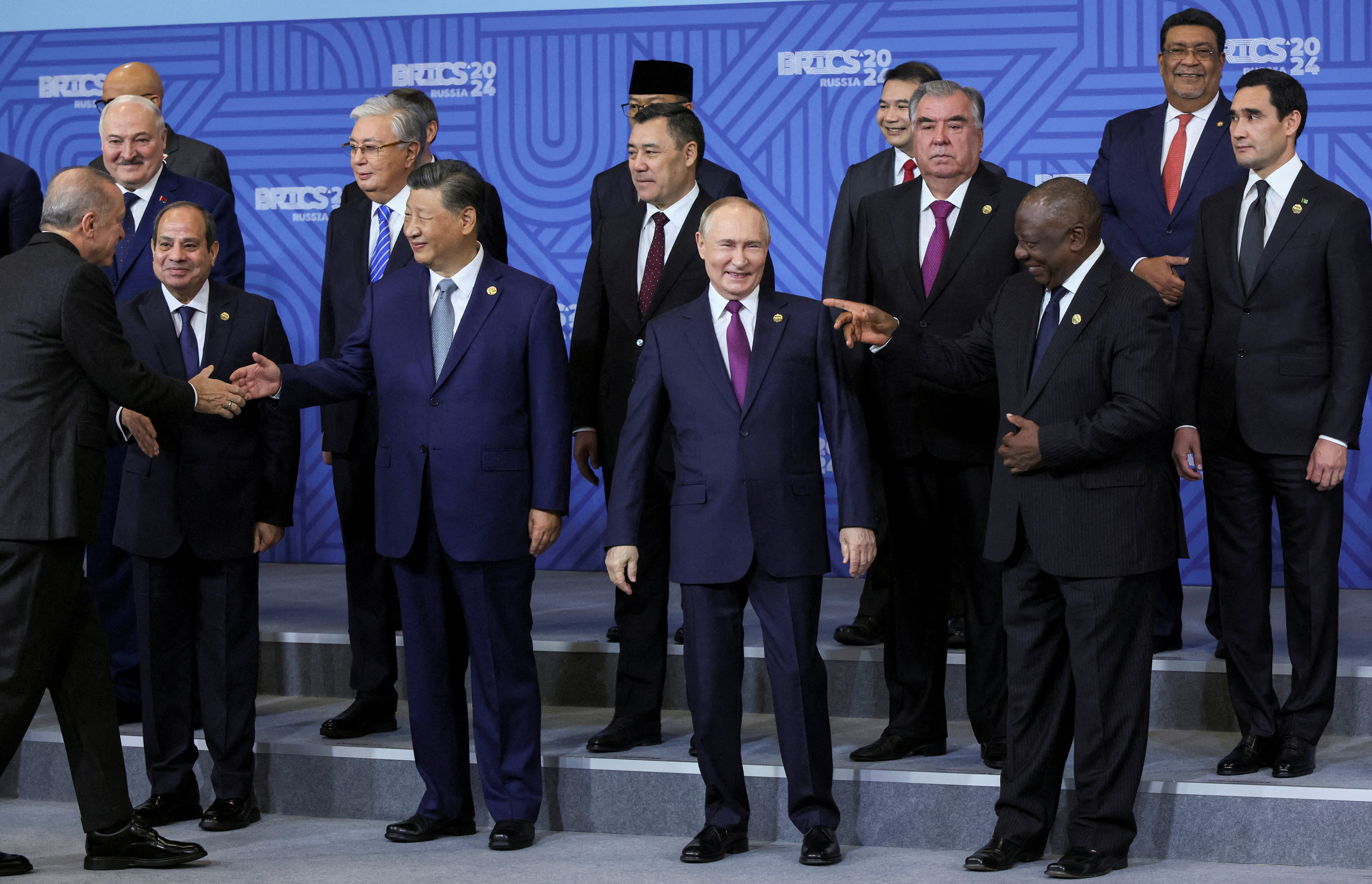
BRICS accelerates as unity is fueled by mutual grievances with the West
A beaming Vladimir Putin was in the Russian city of Kazan welcoming leaders of nations that together account for about half of the world’s population, as the U.S. election worries hung over this week’s gathering of world finance chiefs in Washington.
The emerging economies that make up the BRICS club may be a long way from competing with the International Monetary Fund (IMF) or undermining the supremacy of the US dollar. Its increasing weight, however, was evident at the inaugural summit with its new group of members.
The final declaration, which focused on developing new payment and trade methods that could circumvent Western-dominated structures—including, in the case of Russia, sanctions imposed following its invasion of Ukraine—was lengthy but lacked specificity.
However, the summit achieved a number of diplomatic successes, including the attendance of Tayyip Erdogan, the president of NATO member Turkey, who has indicated interest in joining the BRICS group, and Antonio Guterres, the secretary-general of the United Nations. China and India selected the summit to highlight recent initiatives to strengthen their relationship.
The fact that so many leaders traveled to Russia for the discussions helped Putin refute the idea that his nation is economically isolated from the rest of the world.
Alicia Garcia-Herrero, a senior fellow at the economic think tank Bruegel, stated, “They (Western capitals) are not getting the importance of this thing,” “It’s all signaling that the West is losing power.”
Kazan might not end up in the same place in history as Bretton Woods, the town in New Hampshire where the winners of World War Two created a monetary system eight decades ago that would control the world economy and solidify dollar dominance.
Nonetheless, the discussions this week highlighted discontent with a system that is perceived to underserve a large portion of the world, as evidenced by the fall of capital transfers to developing economies over the last ten years and the underrepresentation of emerging nations in IMF decision-making.
A Sudanese-British businessman named Mo Ibrahim, who leads a charity that monitors governance in Africa, told Reuters, “Look at how many people are rushing to apply to join the BRICS.” According to Putin, around 30 nations have submitted applications.
“People see institutions which are not really representative or democratic – infrastructure established in 1945 or so after the world war, and nothing changes,” said Ibrahim.
Since its inception in 2006 by Brazil, Russia, India, and China, the club has had a mixed record. For starters, according to Mario Holzner of the Vienna Institute for International Economic Studies, its inception hasn’t changed the four founding countries’ previous growth-per-capita trajectory yet (wiiw).
Furthermore, the $72.8 billion in credits, loans, and grants that the World Bank has disbursed this year is far greater than the $5 billion in loans that the BRICS’ New Development Bank (NDB) anticipates making this year. Other initiatives are still in their early stages.
“They might be able to establish some kind of money transfer systems which at least on a low level will work but that most likely won’t really be a game-changer,” Holzner stated.
Hedging wagers
Many observers also point out that as the organization expands, it will become more difficult to reach an agreement on cooperative projects due to disparities in the size and influence of its member nations as well as occasionally conflicting national agendas.
However, others waiting to join view it as a de facto platform for trade, already making up a fifth of world trade.
Pakistan’s Finance Minister Muhammad Aurangzeb told Reuters, “There is a huge upside in sort of linking these corridors,” during the IMF meeting in Washington. “So indeed, we are keen to become a member of BRICS.”
Although the majority of analysts do not believe that the BRICS agreement to establish its own payment system would challenge the dollar’s dominance anytime soon, such measures are appealing to nations who worry that their own policies may eventually lead to Western sanctions.
“By developing this alternative structure, you’re kind of geopolitically cushioning yourself against future friction with the West,” stated Hamish Kinnear, a senior analyst at the international risk intelligence firm Verisk Maplecroft, who referred to BRICS as “the signal and not the cause of the changing world order.”
In fact, many BRICS members and prospective members see it opportunistically as a way to hedge bets in a world undergoing geopolitical transition, rather than as a complete replacement for the IMF as some have dared to suggest.
Shi Yinhong, a professor at Renmin University of China’s School of International Studies, stated, “Given the rise of the Global South, we should respond favorably to the calls from various countries to join BRICS…we should deepen fiscal and financial cooperation.” He added that many BRICS members are also strengthening their ties with the West.
“We must ensure that the international financial system more effectively reflects the changes in the global economic landscape.”
All Categories
Recent Posts
Tags
+13162306000
zoneyetu@yahoo.com



